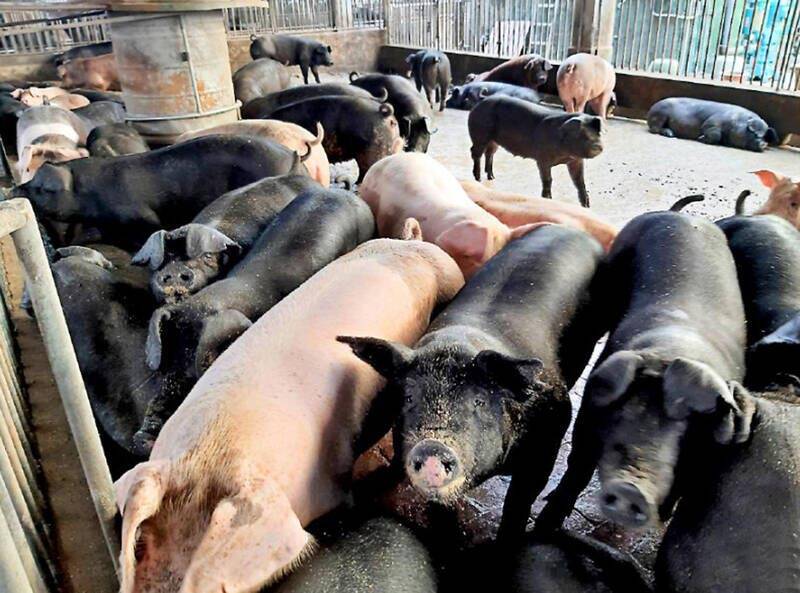Taiwan would likely be recognized as free of classical swine fever (CSF) by the World Organisation for Animal Health (WOAH) in May, the Ministry of Agriculture said yesterday.
The WOAH’s Scientific Commission for Animal Diseases has approved Taiwan’s application for recognition, Animal and Plant Health Inspection Agency Director-General Hsu Jung-pin (徐榮彬) said.
The application is in the WOAH’s 60-day review period, Hsu said.

Photo: Yang Yuan-ting, Taipei Times
If no other WOAH member countries object, Taiwan’s CSF-free status would be officially passed during the organization’s General Session of the World Assembly of Delegates at the end of May, he said.
It is likely that Taiwan would be certified, as objecting countries must submit scientific evidence to back any challenges, he added.
CSF is a highly contagious and fatal viral disease that poses a great threat to the pig farming industry, the Animal and Plant Health Inspection Agency said.
Taiwan eliminated its last case of CSF in 2005, after which it implemented measures to control the spread of the disease, including vaccine immunity, monitoring and reporting, and strengthening biosecurity measures, it said.
In July 2023, Taiwan ended CSF vaccinations and set up a monitoring mechanism to evaluate whether the nation was free of the virus, while border quarantine was enhanced, it said.
After monitoring and rigorous evaluation of whether Taiwan was eligible to apply for CSF-free status, an application was submitted to the WOAH in August last year, the agency said.
The WOAH’s panel of experts reviewed and determined that the quarantine strategies and monitoring data submitted by Taiwan conformed with the Terrestrial Animal Health Code’s standards for CSF-free countries, and approved the application on Feb. 20, it said.
If Taiwan receives CSF-free certification, it would be the only country in Asia to be free from CSF, foot-and-mouth disease and African swine fever, the Ministry of Agriculture said.
Once certified CSF-free, Taiwan may enter into talks about quarantine conditions to export pork to Japan, the ministry said.
Taiwan has been promoting dishes made with Taiwanese pork in Japan in the past few years, piquing the interest of Japanese businesses, said Hung Hsiao-chun (洪曉君), the deputy head of the ministry’s Department of International Affairs.

The manufacture of the remaining 28 M1A2T Abrams tanks Taiwan purchased from the US has recently been completed, and they are expected to be delivered within the next one to two months, a source said yesterday. The Ministry of National Defense is arranging cargo ships to transport the tanks to Taiwan as soon as possible, said the source, who is familiar with the matter. The estimated arrival time ranges from late this month to early next month, the source said. The 28 Abrams tanks make up the third and final batch of a total of 108 tanks, valued at about NT$40.5 billion

Two Taiwanese prosecutors were questioned by Chinese security personnel at their hotel during a trip to China’s Henan Province this month, the Mainland Affairs Council (MAC) said yesterday. The officers had personal information on the prosecutors, including “when they were assigned to their posts, their work locations and job titles,” MAC Deputy Minister and spokesman Liang Wen-chieh (梁文傑) said. On top of asking about their agencies and positions, the officers also questioned the prosecutors about the Cross-Strait Joint Crime-Fighting and Judicial Mutual Assistance Agreement, a pact that serves as the framework for Taiwan-China cooperation on combating crime and providing judicial assistance, Liang

A group from the Taiwanese Designers in Australia association yesterday represented Taiwan at the Midsumma Pride March in Melbourne. The march, held in the St. Kilda suburb, is the city’s largest LGBTQIA+ parade and the flagship event of the annual Midsumma Festival. It attracted more than 45,000 spectators who supported the 400 groups and 10,000 marchers that participated this year, the association said. Taiwanese Designers said they organized a team to march for Taiwan this year, joining politicians, government agencies, professionals and community organizations in showing support for LGBTQIA+ people and diverse communities. As the first country in Asia to legalize same-sex

MOTIVES QUESTIONED The PLA considers Xi’s policies toward Taiwan to be driven by personal considerations rather than military assessment, the Epoch Times reports Chinese President Xi Jinping’s (習近平) latest purge of the Chinese People’s Liberation Army (PLA) leadership might have been prompted by the military’s opposition to plans of invading Taiwan, the Epoch Times said. The Chinese military opposes waging war against Taiwan by a large consensus, putting it at odds with Xi’s vision, the Falun Gong-affiliated daily said in a report on Thursday, citing anonymous sources with insight into the PLA’s inner workings. The opposition is not the opinion of a few generals, but a widely shared view among the PLA cadre, the Epoch Times cited them as saying. “Chinese forces know full well that